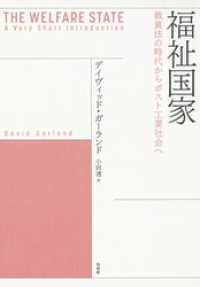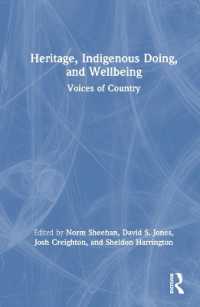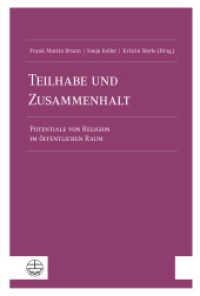- ホーム
- > 洋書
- > 英文書
- > Philosophy
Full Description
The word 'ought' is one of the core normative terms, but it is also a modal word. In this book Matthew Chrisman develops a careful account of the semantics of 'ought' as a modal operator, and uses this to motivate a novel inferentialist account of why ought-sentences have the meaning that they have. This is a metanormative account that agrees with traditional descriptivist theories in metaethics that specifying the truth-conditions of normative sentences is a central part of the explanation of their meaning. But Chrisman argues that this leaves important metasemantic questions about what it is in virtue of which ought-sentences have the meanings that they have unanswered. His appeal to inferentialism aims to provide a viable anti-descriptivist but also anti-expressivist answer to these questions.
Contents
1. Introduction ; 1.1. The Ubiquity of 'Ought' ; 1.2. Some Initial Theoretical Cartography ; 1.3. Metanormative Theorizing and the Philosophy of Language ; 1.4. Compositional Semantics, Some Basics ; 1.5. The Word 'Ought' ; 1.6. Plan ; 2. 'Ought's, Obligations, Reasons, and Values ; 2.1. Introduction ; 2.2. Formal Framework and Toy Analysis of 'Ought' ; 2.3. An Initial Ambiguity View ; 2.4. Analyzing 'Ought' in Terms of Reasons ; 2.5. Analyzing 'Ought' in Terms of Values ; 2.6. Conclusion ; 3. A Possible Worlds Semantics for 'Ought' ; 3.1. Introduction ; 3.2. From Modal Logic to Deontic Necessity and Possibility ; 3.3. From Deontic Necessity to a Simple Possible Worlds Semantics for 'Ought' ; 3.4. Some Reasons to Complicate the Analysis ; 3.5. Kratzer's Improvements ; 3.6. Application of Kratzer's Framework to 'Ought' ; 3.7. The Weakness of 'Ought' Compared to 'Must' ; 3.8. Conclusion ; 4. Problems with Possible Worlds ; 4.1. Introduction ; 4.2. The Challenge of Dilemmas ; 4.3. The Challenge of 'Ought-to-Do' ; 4.4. Conclusion ; 5. A New Semantic Rule for 'Ought' ; 5.1. Introduction ; 5.2. Is 'Ought' Polysemous between Agentive and Non-Agentive Readings? ; 5.3. Imperatival Content ; 5.4. A New Semantic Rule for 'Ought' ; 5.5. Conclusion ; 6. Metanormative Debate Renewed ; 6.1. Introduction ; 6.2. Truth Conditions as Ways Reality Could Be ; 6.3. Truth Conditions as What One Ought to Think ; 6.4. Truth Conditions as Positions in a Space of Implications ; 6.5. Conclusion ; 7. Conclusion ; 7.1. Introduction ; 7.2. Should the Metalanguage of Metanormative Theory be Nonnormative? ; 7.3. What about Other Normative and Evaluative Words and Concepts? ; 7.4. Moral Psychology ; 7.5. The Epistemology of Normativity ; 7.6. Conclusion ; Appendix of Proposed Rules ; Bibliography
-

- 洋書
- Man
-

- 電子書籍
- 福祉国家:救貧法の時代からポスト工業社…





